- Home
- Warhammer 40K
Exodus - Steve Lyons Page 3
Exodus - Steve Lyons Read online
Page 3
Teilloch’s throat had seized up. Alvado glanced at him and must have seen that he wouldn’t get an answer. With a shrug, he broke away from him. He had picked his moment well, because the Space Marines’ backs were turned to him. No one else paid Alvado any heed. His uniform would deflect suspicion, at least for the first part of his escape. He was already stripping off his Home Guard colours for the second.
Teilloch opened a vox-channel to Corporal Barnard.
‘It’s Trooper Alvado,’ he reported. His throat was still dry. His tongue felt too large in his mouth, but what choice did he have? ‘He has… He… The pressure was too much for him, corporal. He’s deserted his post and is–’
‘Then you know your duty, Teilloch,’ Barnard said tersely, and broke the connection. It was only what he had expected to hear – but he had needed to hear it.
He raised his gun and squinted along its barrel. Alvado had reached the bottom of the landing ramp. For a fraction of a second, he paused and glanced over his shoulder, and his face, afraid but hopeful, was framed in Teilloch’s sights.
Teilloch held his breath and squeezed his trigger.
The city was shaking itself to pieces.
The Ice Warriors had kept moving as long as they could – even through the warning tremors that had robbed them of their footing again and again. Ven Mikkelson’s legs, from the knees down, were a mass of cuts and bruises. Still, they had made up lost time and were barely a kilometre from their destination.
They had been so close. Now, they huddled beneath another cathedral archway, feeling helpless and resentful in the grip of forces stronger than they were.
‘Sergeant,’ ventured Bullski, ‘couldn’t we try–?’ Before the question could be asked, another building disintegrated, not two blocks away from them. The dust cloud of its passing rolled over them, setting them to coughing and spluttering.
Ven Mikkelson waited fretfully, as long as he dared. Then he moved his squad out again, though the ground had not yet completely settled. Almost immediately, a battered groundcar came bouncing towards them, forcing them to dive for cover once more.
He voxed the waiting rescue ship. At least, he hoped it was still waiting. ‘Could you possibly hold out a little longer?’
‘That’s a negative, sergeant. Another quake that strong, and we–’
‘I know.’ He prayed he would get a chance to fight again. ‘But we’re five minutes away from you – less than five.’
A short pause ensued. Then, ‘We’ll wait as long as we can.’
Ven Mikkelson relayed the news to his three comrades. Hope spurred the Ice Warriors, battered and exhausted though they were, to renewed efforts. They ran as if all the horrors of the warp were on their tails.
A heavy flagpole, wrenched from an office building, struck Bullski across his broad shoulders. An inch higher and it would have cracked his skull. The Imperial standard would have made an ironic shroud for him. He refused to let the incident slow him down, ploughing on, teeth gritted with pain.
They raced past burning buildings, overturned vehicles and broken bodies strewn across fresh heaps of settling rubble. Ven Mikkelson’s lungs were in spasm. His uniform, designed for far colder climes than this, had never felt so stifling. Sweat poured from beneath his hat and his cheeks were on fire. With every step, it seemed that his feet grew heavier and harder to lift.
Then, one of his comrades murmured, ‘Thank the Emperor!’
He lifted his head, rubbed sweat from his eyes and saw it too: the sweetest sight he had ever beheld. The airstrip lay ahead of them and, squatting on a landing pad was a single, long, angular ship. The Devourer’s nose cone was closed, its engines running, but its passenger ramp was still down. A squad of Ice Warriors formed a cordon across its foot, holding back a small, fractious crowd.
Ven Mikkelson pushed his way through the mob, ignoring their protesting howls. ‘Why?’ someone yelled, belligerently. ‘Why do you get to live, and not us?’ He staggered up the ramp, light-headed. He made sure that his comrades had boarded, then stumbled into the blessedly cool embrace of the Devourer’s belly himself. The sentry squad was right behind him; their sergeant fired three shots to discourage anyone from trying to follow them.
The ramp was already retracting, blotting out the crimson daylight. They could feel the deck plates shuddering as the old ship gathered itself for takeoff. Ven Mikkelson mouthed a thankful prayer to the Emperor. He peeled off his hat and rested his feverish brow against a nearby viewport, feeling the accusing eyes of his comrades on his back.
‘A trained soldier – any one of us – is worth more to the Imperium than an admin clerk or a labourer,’ he snarled. ‘And this is their world, after all. They are the ones who overlooked what was happening in their midst until it was too late. We fought for them. We fought as long and as hard as we could. We leave their fate in the Emperor’s hands, now. We have nothing to regret.’
Through the armourglass circle, he saw the airstrip dropping away. The crowd of would-be refugees had been scattered and some burned by the Devourer’s exhaust blast, but they were picking themselves up and screaming futilely, even throwing rocks at the escaping vessel. In the centre of it all, Ven Mikkelson saw a child – no more than four years old – sitting alone, crying and, despite his admonishments, he could not wrench his eyes away from the viewport.
He watched until he could no longer make out individuals, only dark shapes swarming across the shattered city, without purpose, without hope. He kept on watching, even after black clouds closed like curtains beneath him and rendered the people, the city and Katraxis itself invisible to him.
A spaceport fence had come down.
The mob that had been pushing, pulling, tearing at it whooped as they trampled broken wire into the dirt. Their jubilation didn’t last long. The fence had stood between them and their desperate hopes, so had become a focal point for their anger. Now, as they swarmed around the spaceport buildings, they saw the landing pads, all of them, standing empty. Their efforts had been futile.
The truth was beginning to dawn on Teilloch too: that no more rescue ships were coming. He should have known when the Space Marines left, he thought. He should have known that Alvado had been right all along. Even the Emperor’s Angels have turned their backs on Katraxis!
More fights were beginning to break out. A trooper scolded a group for blaspheming in their grief, and they set about him with their fists. Teilloch should have assisted, but others had beaten him to it and the situation was only escalating. Anyway, he felt too numb. He had grown accustomed to the roars of spaceship engines. With these gone, he felt a blanket of silence settle over him. The prevailing condition around the port, among civilians and soldiers alike, was shellshock. He couldn’t look at the bodies strewn about him. He especially couldn’t bear to see the faces of his own victims – a one-time friend among them.
Corporal Barnard had wandered away from his squad. Teilloch spotted him sitting on the ground, knees drawn up to his chest, head buried in his arms. He could see no Home Guard officers, no one to give him fresh instructions. There had been plenty around a few minutes ago – where had they all gone?
Who would tell him what to do now?
‘My people. My friends. I thank you for your continued understanding in these difficult times.’ Governor Strawhagen’s voice burst over Teilloch’s comm-bead once more. ‘The Emperor has asked much of us, as is His right – but our faith in Him has been amply rewarded.’
He sounded reassuringly close. Teilloch found himself scouring the red sky, as if he might see the governor’s flagship hovering over him protectively. Others were doing the same, lifting their heads in hope again, but only for a moment.
‘Be assured that the xenos will never take Katraxis. Yes, they have dealt us a grievous blow indeed, but for that they are fated to suffer the Emperor’s vengeance. Imperial war ships have been despatched. The tyranid
s will soon descend upon this world – our bright, precious world – to find their victory a pyrrhic one. Katraxis will be destroyed, to ensure the–’
The rest of the message was drowned out by howls of fury. Teilloch himself felt his stomach turning over, his knees weakening.
Exterminatus. He remembered the word from old newsreels. The destruction of a world that had become irreversibly contaminated. His heart had swelled at the thought of the Emperor’s torpedoes, consuming and purifying the unclean – xenos, mutants, heretics – in their amassed legions. He had never imagined that he might burn alongside them.
Strawhagen was still straining to be heard, telling him – telling those tens of billions of loyal subjects left behind – why they should welcome this great mercy. He concluded with a prayer to the Emperor, during which his voice broke up as his ship moved out of vox range.
What do I do now? Arch Teilloch had never asked that question before. He had always known his duty. He had always had orders to follow. The masses would surely resume their rioting once their situation sank in. Should he try to impose order? For what purpose? Should he try to protect them? How could he?
Whatever he did, he couldn’t change their fate. Nor his own.
Some of his comrades had reached the same conclusion. They were throwing down their weapons, stripping off their orange and blue uniforms. Some did so angrily, stamping on their helmets in protest at being betrayed. Others did so out of fear. Teilloch suddenly realised that his colours might make him a target, marking him out as a symbol of that very betrayal.
He began to unbutton his tunic, but stopped himself. Who am I without it? He had never had to ask that question either. He feared what the answer might be. Teilloch had lived a lifetime of devotion. Could he really turn his back on all that, in these final few hours? What would it say about the worth of his life if he did?
He had one other option – one way to silence those questions, to quell his doubts and fears. Some might consider it a sin, but how could it be, when he was doomed already? He had seen the Emperor’s mercy being granted to others…
Teilloch turned his autogun around. He nuzzled the end of its long barrel underneath his chin. He closed his eyes.
‘What in the warp kept you?’
The Devourer had itself been devoured by an orbiting troopship. Ven Mikkelson’s captain stood waiting for him in the cavernous hangar bay. The sergeant snapped his aching muscles to attention and saluted. ‘My apologies, sir. We encountered… complications en route.’
The captain’s scowl softened a little. ‘A tyranid ambush, I hear?’
‘That’s right, sir. I’ll submit a full report.’
‘Within the hour, sergeant.’
He had planned to head straight to his bunk, in his tiny cabin. Instead, Ven Mikkelson trudged after his comrades to the mess hall. Usually, when the Ice Warriors returned from a mission, the mood in the hall was boisterous. In contrast, today, it was subdued and bitter.
He didn’t feel like eating. He sat in a corner with his back to the room. He nursed a mug of tanna tea and stared at a blank data-slate. He tried to find horrific enough descriptors for the monsters in the ruined cathedral – the lictors. The only thing he could picture was Vilhelm’s eyes as his life’s light faded from them and he felt frustrated that he couldn’t avenge that lost life.
He became aware of shutters sliding over the viewports. The troopship was about to leave the Katraxis system. Not a moment too soon for his liking. Ven Mikkelson braced himself for the jump into warpspace.
The next thing he knew, he was catapulted from his seat, dowsed in steaming tanna. As he scrambled to his feet, a wave of dizziness crashed over him and his stomach churned. Around him, his comrades were picking themselves up too. The mess hall looked as if it had been turned upside-down and shaken.
Something was badly wrong. Ven Mikkelson looked at the shuttered ports. He knew the perils of the warp, of course, but his many journeys through it had perhaps inured him to them. Had his luck run out at last?
He was a passenger on this ship, not a crewmember – the same as his comrades. They could do little but wait for orders and perhaps pray. At last, vox-speakers flared to life. A voice instructed all aircrew to man their vessels. This caused an immediate stir. ‘What’s happening?’ many troopers demanded to know. Some put their pleas to Ven Mikkelson himself. ‘Are we under attack?’
Next, they heard from the troopship’s naval captain. ‘We are having a few problems. Our enginseers are working on it, but they say… and this comes from our navigator too… it may be that warpspace is somehow closed to us.’
More minutes crawled by. The younger troopers became ever more agitated. They paced the room, speculating about a range of dreadful fates and picking arguments with each other over anything and everything. The more seasoned Ven Mikkelson simply righted his chair and sat again. His data-slate was cracked across the screen. He suspected he would never write that report now, anyway.
Colonel Ztanlev, commander of the 132nd regiment, strode into the mess hall. Immediately, he found himself surrounded by impatient guardsmen, and had to call for order before he could deliver his briefing. ‘This is the situation as it has been explained to me,’ he began.
‘The xenos have broadcast a signal – a psychic signal – to disrupt the warp itself. We have lost communications, and of course our warp engines are useless to us. By the Emperor’s grace, ours is the only ship affected. Our Valhallan fellows jumped before the signal was sent. So too did the rescue ships and the Adeptus Astartes’ strike cruiser. I regret to say, however–’
And there they were: the words for which Ven Mikkelson had waited but prayed not to hear.
‘–that the xenos fleet has caught up to us.’ Whatever Ztanlev said next, it was drowned out by questioning voices. Demanding silence once again, he continued. ‘Our auspex reveals a great behemoth of a vessel, an unholy fusion of mechanical and biological matter. Thank the Emperor, he has protected our senses from this abomination.’ The warp shutters were still down. The threat without seemed somehow distant, disconnected from Ven Mikkelson’s reality. For decades, this ship, always filled with good comrades, had been his only home, his sanctuary.
‘We have two options. The first is to run, which would be futile. Even if we were fast enough, we lack the fuel – and indeed the provisions – to reach the next system on sub-light engines.’ If anything, this was an understatement.
‘Our second option,’ the colonel continued, ‘is to do as the men of Valhalla have always done. Make no mistake, we are one ship against many, and the hive ship alone is perhaps twenty times our size. The odds against us are overwhelming, but we have the Emperor behind us, while our enemies have only His abiding scorn.
‘By chance or by fate, we are directly facing the enemy. Our weapons are unlikely to have much effect upon it, but we will fire them anyway. Our Devourers and Vulture gunships will distract the hive ship’s escorts, while we–’
A fresh round of protests erupted. In the midst of the clamour, Trooper Bullski found Ven Mikkelson and clapped a heavy hand on his shoulder. ‘This is our fault,’ he growled. ‘We delayed the rescue ship, and because we did…’ Ven Mikkelson couldn’t answer him, couldn’t face his comrade’s accusing glare. The guilt that had been gnawing at his insides had grown to paralyse his vocal chords.
‘The enginseers will set our engines to overload,’ persisted Colonel Ztanlev. ‘We intend to ram the hive ship and smash right through its hull. With the Emperor’s blessing, we may start some chain reaction to bring that bloated monster down – in which case, Katraxis will be spared the xenos blight and our regiment’s name will be legend. I ask you, my comrades, my friends, to join with me as we pray for such a glorious outcome. For the Emperor!’
‘For the Emperor!’ The response from the assembled Ice Warriors was somewhat muted. Still, it was expected, and they provided it
obediently – all of them but for Sergeant Konrad Ven Mikkelson.
He felt the deck plates rattling beneath his feet. He heard the pitch of the engines increasing as they picked up speed. Bullski is right, he thought numbly. Better that we hadn’t made it to the extraction point at all. Better that our comrades had left, on time, without us. Better that we had stopped outside the temple to help.
At least, then, we would have died for something…
They were smashing the city.
As if it hadn’t endured enough. A furious, unreasoning mob was now shattering any remaining windows, kicking down doors, battering abandoned vehicles with sticks and shovels. They were stoking fires inside the creaking shells of once-thriving businesses and governmental offices.
There were preachers on every street corner, proclaiming the Emperor’s word, which varied from one of them to the next. Some exhorted their fellows to rein in their aggression, to spend their final hours in contemplation and prayer instead. Others encouraged more violence: ‘If the xenos are to take this world, if only for an hour, then let them take its ruins.’
Some people were looting shops and even churches, fighting over torn clothes, battered hololith projectors and tarnished candlesticks. Teilloch couldn’t imagine the tyranids wanting such things. Others binged on stolen food and liquor, or – this, he could better understand – sought to arm themselves.
He had left Katraxis Port, to wander the streets in a daze. He realised that his feet, by habit, were taking him home. For what purpose? He hadn’t seen his hab in weeks. He didn’t know if the quakes had left it standing.
He still wore his orange-and-blue uniform, still carried his autogun. He hadn’t been able to pull the trigger. He didn’t know if that made him strong or weak. Was it faith that kept him alive, he asked himself, or cowardice?
A horrified scream and a pointed finger drew his gaze upwards. He saw lights in the red sky, shining fuzzily through the pollution. One huge light in particular – pulsing in a way that he found indescribably hateful, making his eyes water to look at it – was surrounded by scores of lesser glows. So, this is it, he thought.

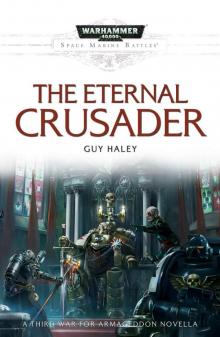 The Eternal Crusader - Guy Haley
The Eternal Crusader - Guy Haley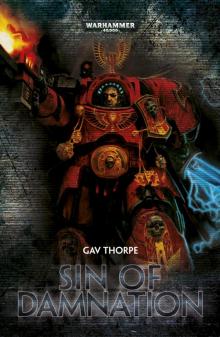 Sin of Damnation - Gav Thorpe
Sin of Damnation - Gav Thorpe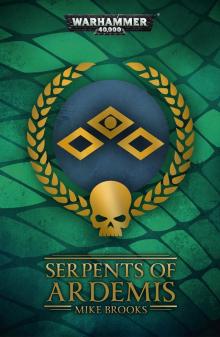 Serpents of Ardemis - Mike Brooks
Serpents of Ardemis - Mike Brooks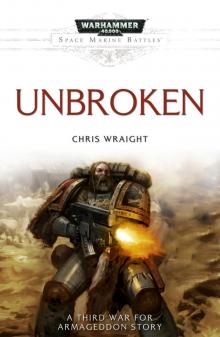 Unbroken - Chris Wraight
Unbroken - Chris Wraight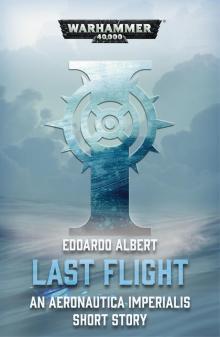 Last Flight - Edoardo Albert
Last Flight - Edoardo Albert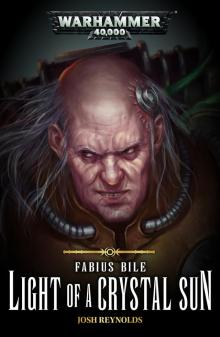 Light of a Crystal Sun - Josh Reynolds
Light of a Crystal Sun - Josh Reynolds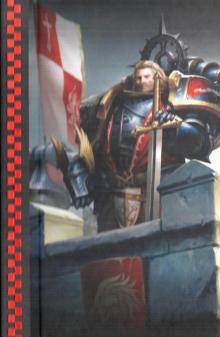 Lion El'Jonson- Lord of the First - David Guymer
Lion El'Jonson- Lord of the First - David Guymer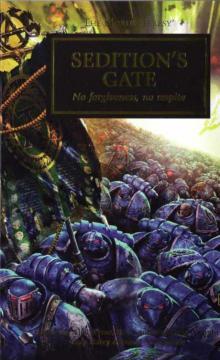 Sedition's Gate - Nick Kyme & Chris Wraight
Sedition's Gate - Nick Kyme & Chris Wraight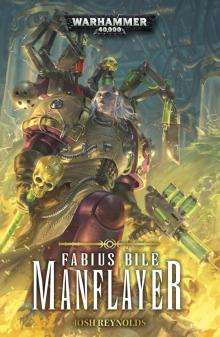 Manflayer - Josh Reynolds
Manflayer - Josh Reynolds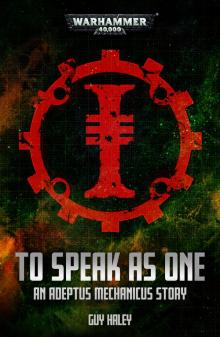 To Speak as One - Guy Haley
To Speak as One - Guy Haley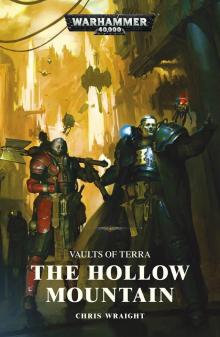 Vaults of Terra- The Hollow Mountain - Chris Wraight
Vaults of Terra- The Hollow Mountain - Chris Wraight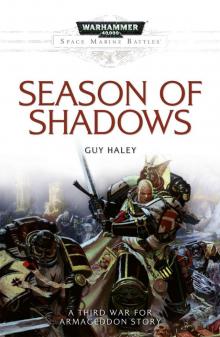 Season of Shadows - Guy Haley
Season of Shadows - Guy Haley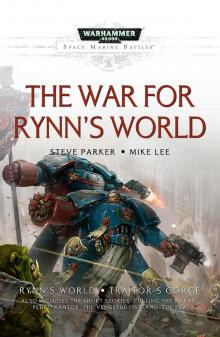 The War for Rynn's World - Steve Parker & Mike Lee
The War for Rynn's World - Steve Parker & Mike Lee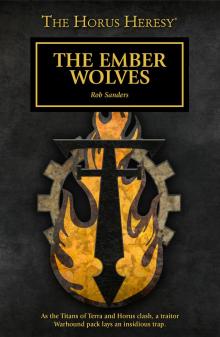 The Ember Wolves - Rob Sanders
The Ember Wolves - Rob Sanders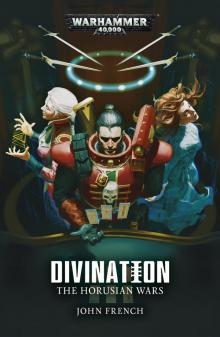 Divination - John French
Divination - John French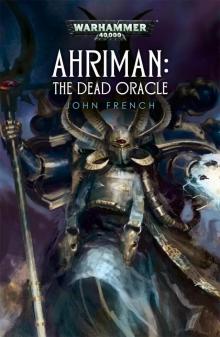 The Dead Oracle - John French
The Dead Oracle - John French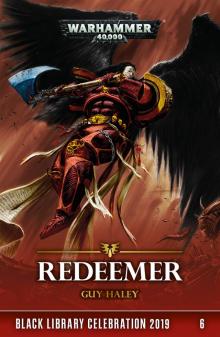 Redeemer - Guy Haley
Redeemer - Guy Haley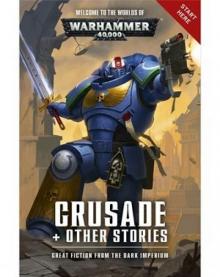 Crusade & Other Stories - Dan Abnett Et Al.
Crusade & Other Stories - Dan Abnett Et Al.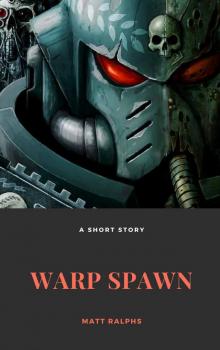 Warp Spawn - Matt Ralphs
Warp Spawn - Matt Ralphs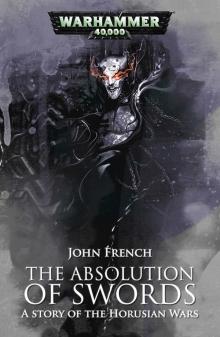 The Absolution of Swords - John French
The Absolution of Swords - John French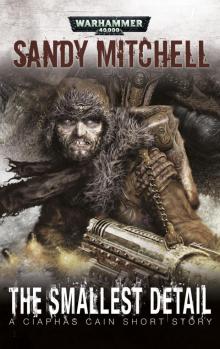 The Smallest Detail - Sandy Mitchell
The Smallest Detail - Sandy Mitchell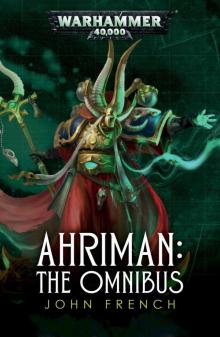 The Omnibus - John French
The Omnibus - John French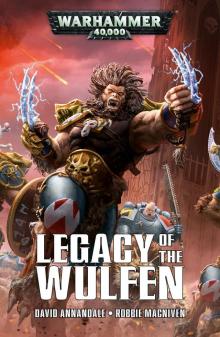 Legacy of the Wulfen - David Annandale & Robbie MacNiven
Legacy of the Wulfen - David Annandale & Robbie MacNiven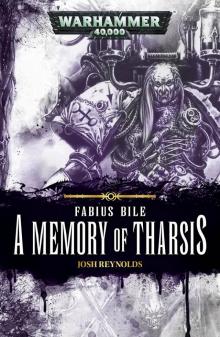 A Memory of Tharsis - Josh Reynolds
A Memory of Tharsis - Josh Reynolds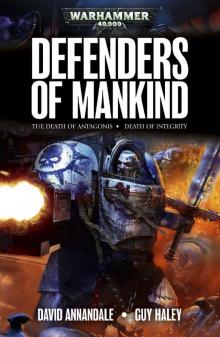 Defenders of Mankind - David Annandale & Guy Haley
Defenders of Mankind - David Annandale & Guy Haley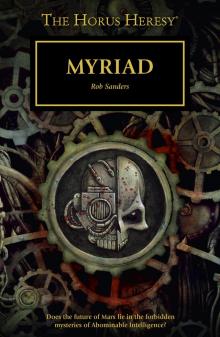 Myriad - Rob Sanders
Myriad - Rob Sanders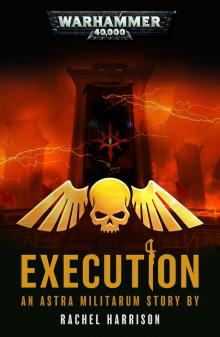 Execution - Rachel Harrison
Execution - Rachel Harrison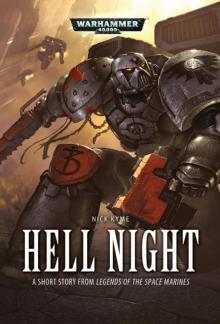 Hell Night - Nick Kyme
Hell Night - Nick Kyme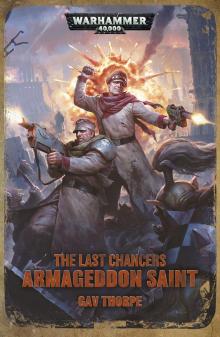 Armageddon Saint - Gav Thorpe
Armageddon Saint - Gav Thorpe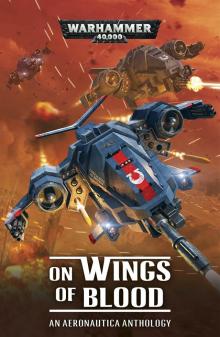 On Wings of Blood
On Wings of Blood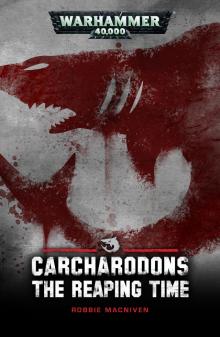 The Reaping Time - Robbie MacNiven
The Reaping Time - Robbie MacNiven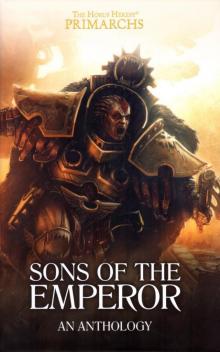 Sons of the Emperor
Sons of the Emperor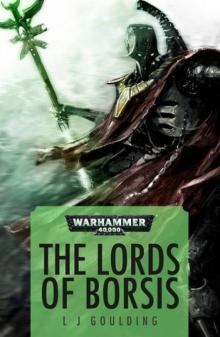 The Lords of Borsis - L J Goulding
The Lords of Borsis - L J Goulding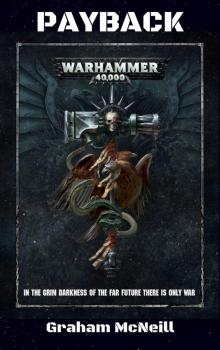 Payback - Graham McNeill
Payback - Graham McNeill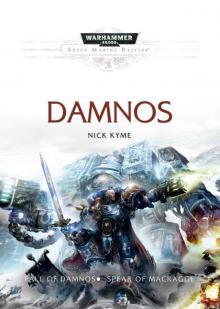 Damnos - Nick Kyme
Damnos - Nick Kyme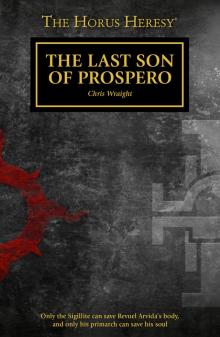 The Last Son of Prospero - Chris Wraight
The Last Son of Prospero - Chris Wraight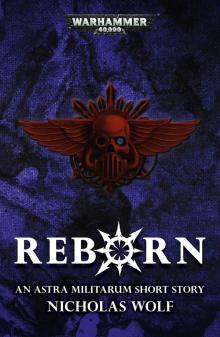 Reborn - Nicholas Wolf
Reborn - Nicholas Wolf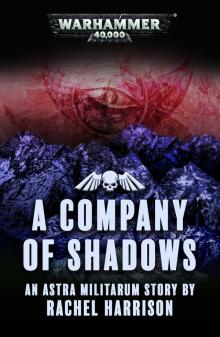 A Company of Shadows - Rachel Harrison
A Company of Shadows - Rachel Harrison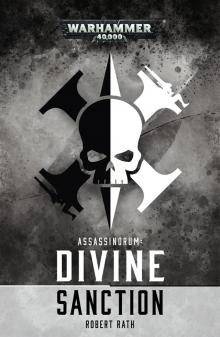 Assassinorum- Divine Sanction - Robert Rath
Assassinorum- Divine Sanction - Robert Rath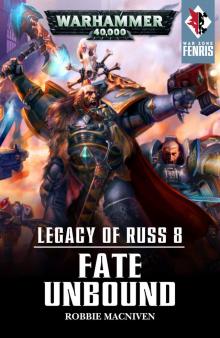 Fate Unbound - Robbie MacNiven
Fate Unbound - Robbie MacNiven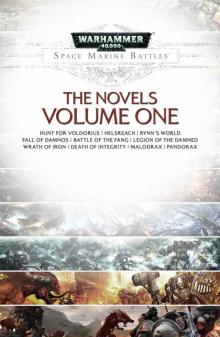 Space Marine Battles - the Novels Volume 1
Space Marine Battles - the Novels Volume 1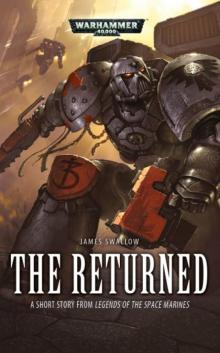 The Returned - James Swallow
The Returned - James Swallow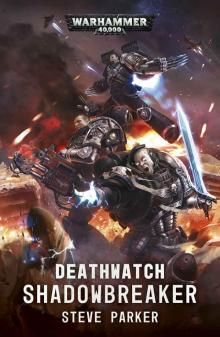 Shadowbreaker - Steve Parker
Shadowbreaker - Steve Parker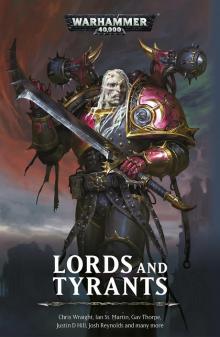 Lords and Tyrants
Lords and Tyrants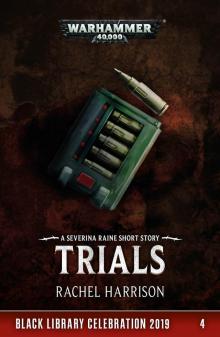 Trials - Rachel Harrison
Trials - Rachel Harrison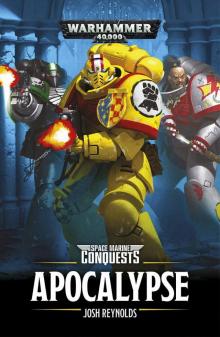 Apocalypse - Josh Reynolds
Apocalypse - Josh Reynolds The labyrinth - Richard Ford
The labyrinth - Richard Ford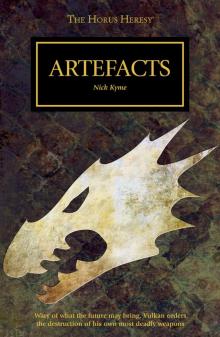 Artefacts - Nick Kyme
Artefacts - Nick Kyme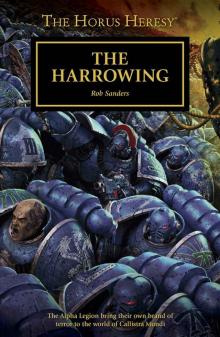 The Harrowing - Rob Sanders
The Harrowing - Rob Sanders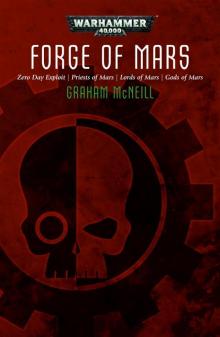 Forge of Mars - Graham McNeill
Forge of Mars - Graham McNeill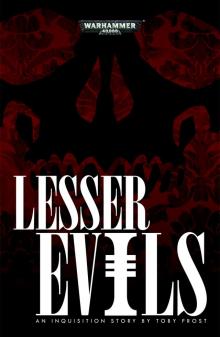 Lesser Evils - Toby Frost
Lesser Evils - Toby Frost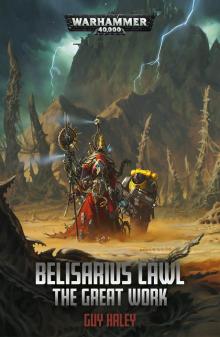 Belisarius Cawl- the Great Work - Guy Haley
Belisarius Cawl- the Great Work - Guy Haley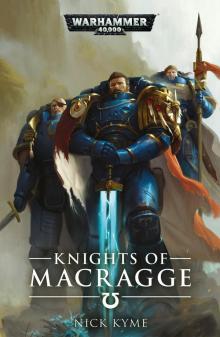 Knights of Macragge - Nick Kyme
Knights of Macragge - Nick Kyme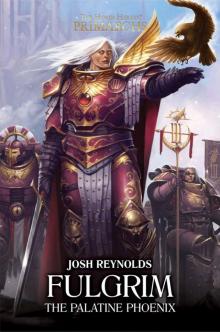 Fulgrim- The Palatine Phoenix - Josh Reynolds
Fulgrim- The Palatine Phoenix - Josh Reynolds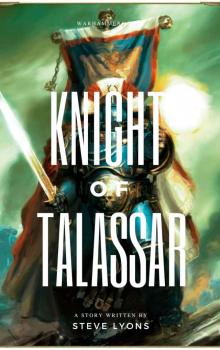 Knight of Talassar - Steve Lyons
Knight of Talassar - Steve Lyons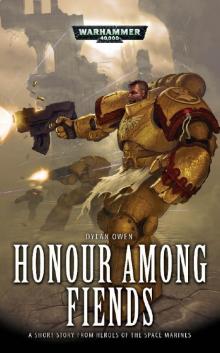 Honour Among Fiends - Dylan Owen
Honour Among Fiends - Dylan Owen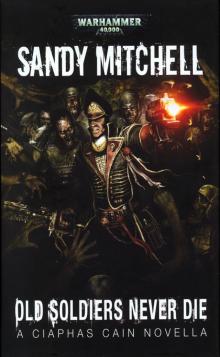 Old Soldiers Never Die - Sandy Mitchell
Old Soldiers Never Die - Sandy Mitchell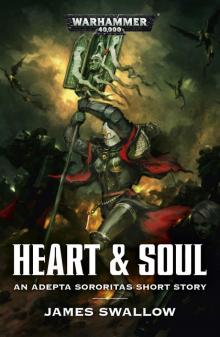 Heart & Soul - James Swallow
Heart & Soul - James Swallow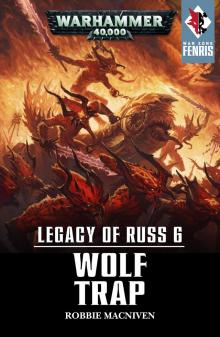 Wolf Trap - Robbie MacNiven
Wolf Trap - Robbie MacNiven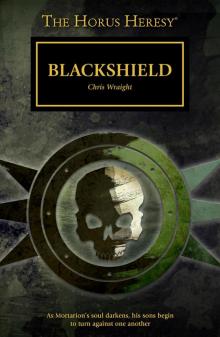 Blackshield - Chris Wraight
Blackshield - Chris Wraight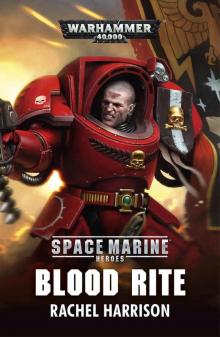 Blood Rite - Rachel Harrison
Blood Rite - Rachel Harrison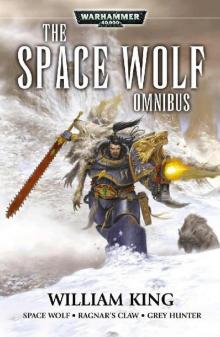 The Space Wolf Omnibus - William King
The Space Wolf Omnibus - William King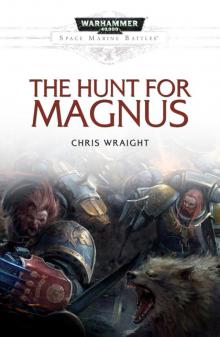 The Hunt for Magnus - Chris Wraight
The Hunt for Magnus - Chris Wraight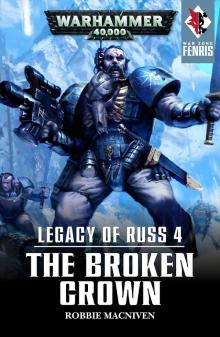 The Broken Crown - Robbie MacNiven
The Broken Crown - Robbie MacNiven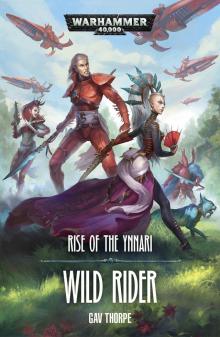 Wild Rider - Gav Thorpe
Wild Rider - Gav Thorpe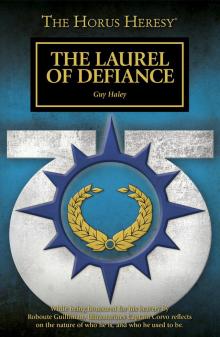 The Laurel of Defiance - Guy Haley
The Laurel of Defiance - Guy Haley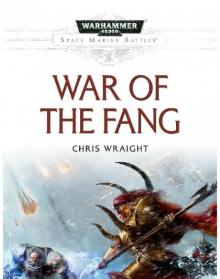 War of the Fang - Chris Wraight
War of the Fang - Chris Wraight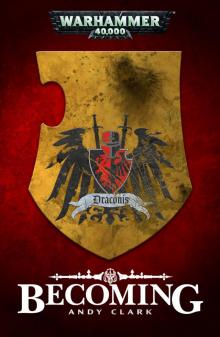 Becoming - Andy Clark
Becoming - Andy Clark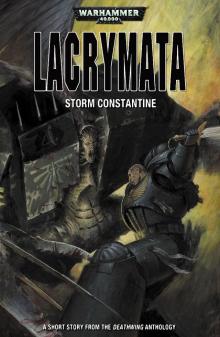 Lacrymata - Storm Constantine
Lacrymata - Storm Constantine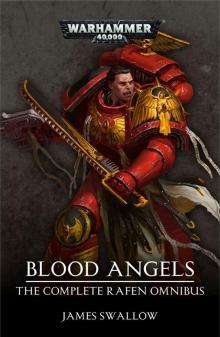 Blood Angels - The Complete Rafen Omnibus - James Swallow
Blood Angels - The Complete Rafen Omnibus - James Swallow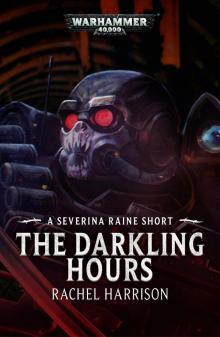 The Darkling Hours - Rachel Harrison
The Darkling Hours - Rachel Harrison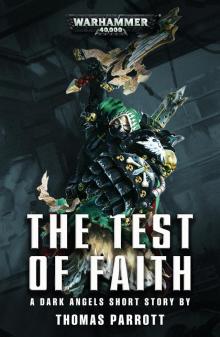 The Test of Faith - Thomas Parrott
The Test of Faith - Thomas Parrott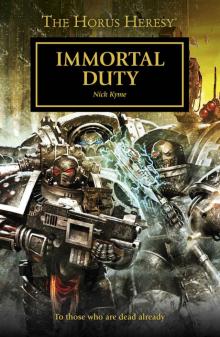 Immortal Duty - Nick Kyme
Immortal Duty - Nick Kyme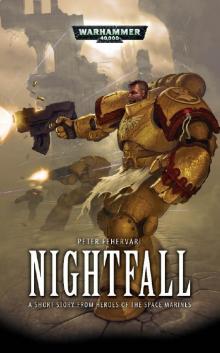 Nightfall - Peter Fehervari
Nightfall - Peter Fehervari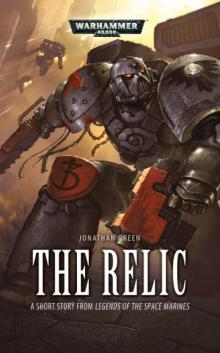 The Relic - Jonathan Green
The Relic - Jonathan Green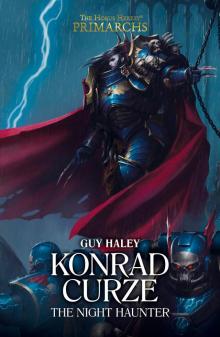 Konrad Curze the Night Haunter - Guy Haley
Konrad Curze the Night Haunter - Guy Haley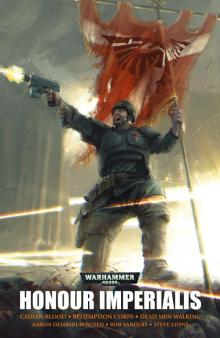 Honour Imperialis - Aaron Dembski-Bowden
Honour Imperialis - Aaron Dembski-Bowden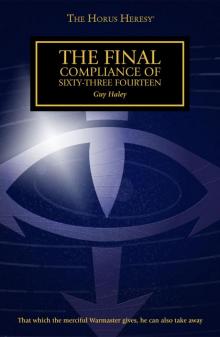 The Final Compliance of Sixty-Three Fourteen - Guy Haley
The Final Compliance of Sixty-Three Fourteen - Guy Haley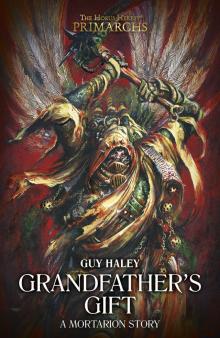 Grandfather’s Gift - Guy Haley
Grandfather’s Gift - Guy Haley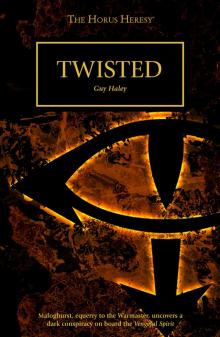 Twisted - Guy Haley
Twisted - Guy Haley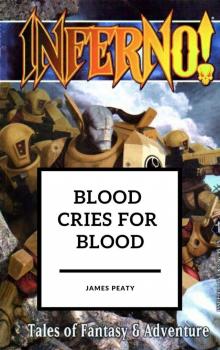 Blood Cries for Blood - James Peaty
Blood Cries for Blood - James Peaty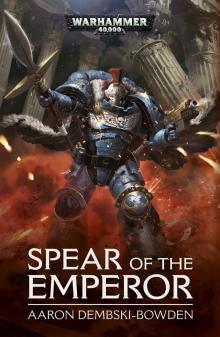 Spear of the Emperor - Aaron Dembski-Bowden
Spear of the Emperor - Aaron Dembski-Bowden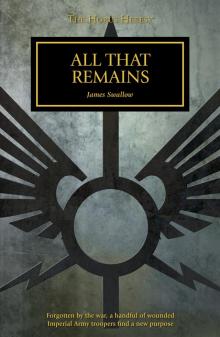 All That Remains - James Swallow
All That Remains - James Swallow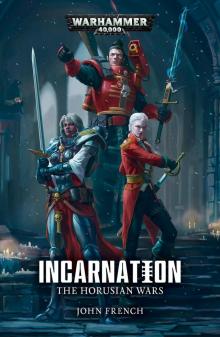 Incarnation - John French
Incarnation - John French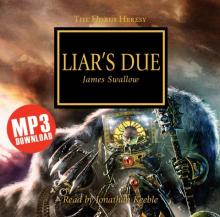 Liar's Due - Ben Swallow
Liar's Due - Ben Swallow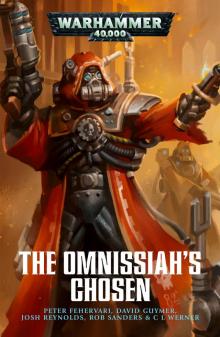 The Omnissiah's Chosen - Peter Fehervari
The Omnissiah's Chosen - Peter Fehervari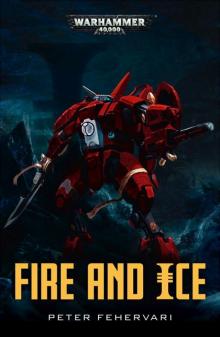 Fire and Ice - Peter Fehervari
Fire and Ice - Peter Fehervari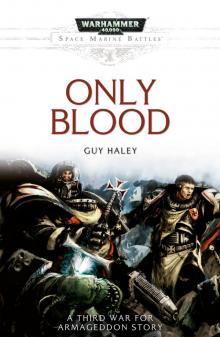 Only Blood - Guy Haley
Only Blood - Guy Haley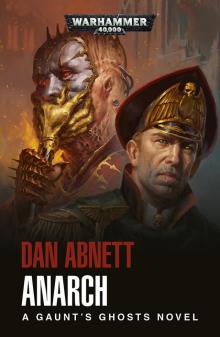 Anarch - Dan Abnett
Anarch - Dan Abnett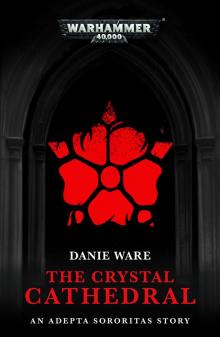 The Crystal Cathedral - Danie Ware
The Crystal Cathedral - Danie Ware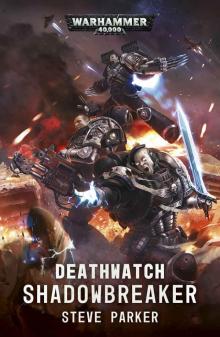 Shadowbreaker
Shadowbreaker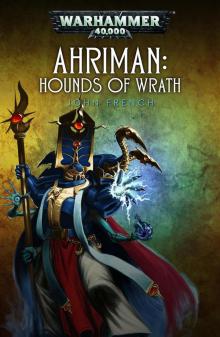 Hounds of Wrath - John French
Hounds of Wrath - John French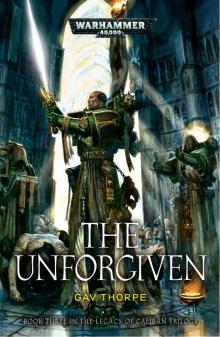 The Unforgiven - Gav Thorpe
The Unforgiven - Gav Thorpe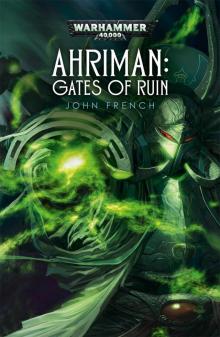 Gates of Ruin - John French
Gates of Ruin - John French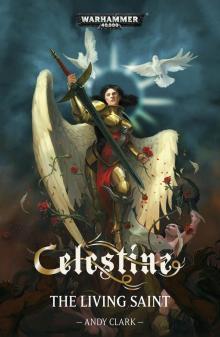 Celestine - Andy Clark
Celestine - Andy Clark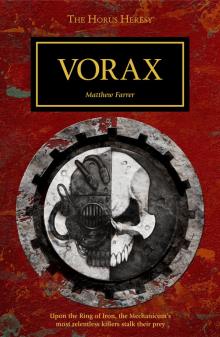 Vorax - Matthew Farrer
Vorax - Matthew Farrer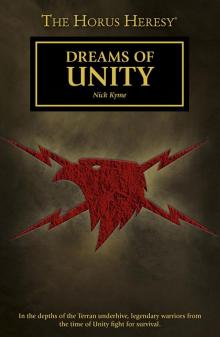 Dreams of Unity - Nick Kyme
Dreams of Unity - Nick Kyme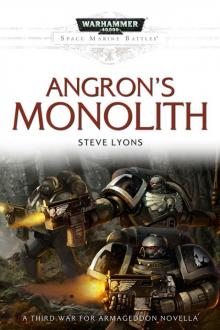 Angron's Monolith - Steve Lyons
Angron's Monolith - Steve Lyons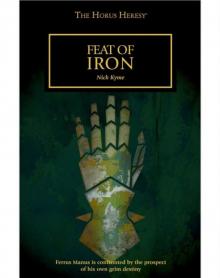 Feat of Iron - Nick Kyme
Feat of Iron - Nick Kyme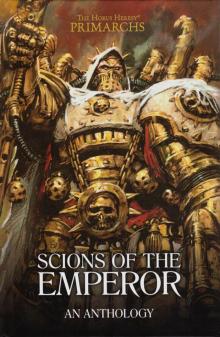 Scions of the Emperor
Scions of the Emperor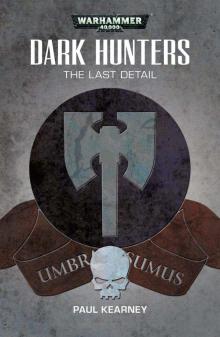 The Last Detail - Paul Kearney
The Last Detail - Paul Kearney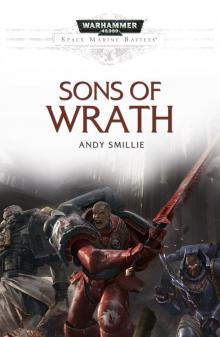 Sons of Wrath - Andy Smillie
Sons of Wrath - Andy Smillie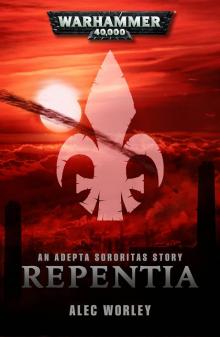 Repentia - Alec Worley
Repentia - Alec Worley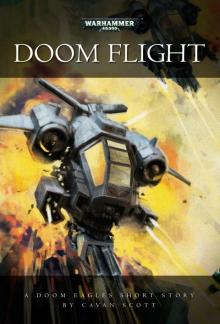 Doom Flight - Cavan Scott
Doom Flight - Cavan Scott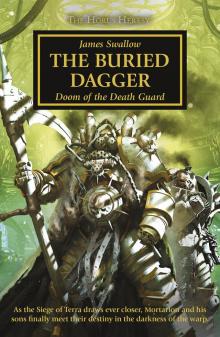 The Buried Dagger - James Swallow
The Buried Dagger - James Swallow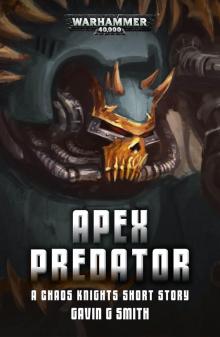 Apex Predator - Gavin G Smith
Apex Predator - Gavin G Smith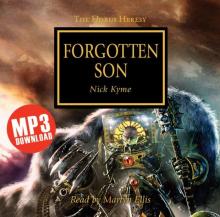 Forgotten Sons - Nick Kyme
Forgotten Sons - Nick Kyme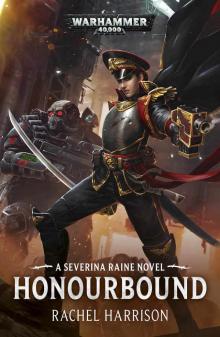 Honourbound - Rachel Harrison
Honourbound - Rachel Harrison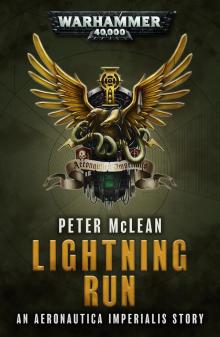 Lightning Run - Peter McLean
Lightning Run - Peter McLean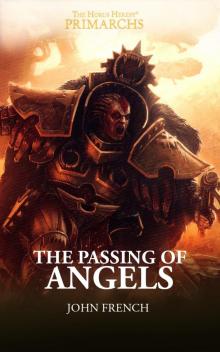 The Passing of Angels - John French
The Passing of Angels - John French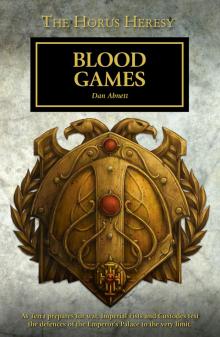 Blood Games - Dan Abnett
Blood Games - Dan Abnett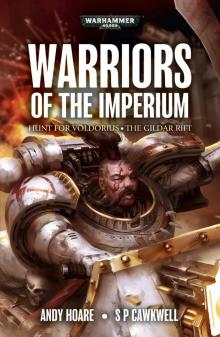 Warriors of the Imperium - Andy Hoare & S P Cawkwell
Warriors of the Imperium - Andy Hoare & S P Cawkwell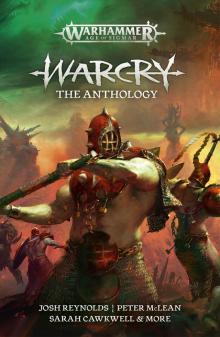 Warcry
Warcry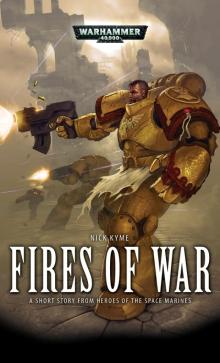 Fires of War - Nick Kyme
Fires of War - Nick Kyme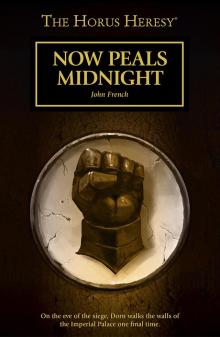 Now Peals Midnight - John French
Now Peals Midnight - John French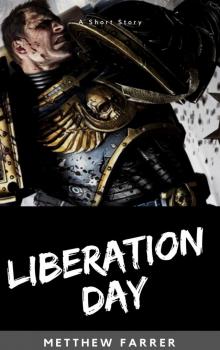 Liberation Day - Matthew Farrer
Liberation Day - Matthew Farrer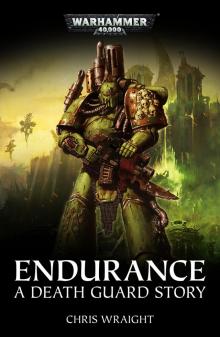 Endurance - Chris Wraight
Endurance - Chris Wraight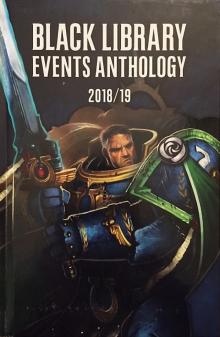 Black Library Events Anthology 2018-19
Black Library Events Anthology 2018-19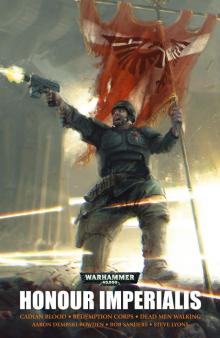 Honour Imperialis - Braden Campbell & Aaron Dembski-Bowden & Chris Dows & Steve Lyons & Rob Sanders
Honour Imperialis - Braden Campbell & Aaron Dembski-Bowden & Chris Dows & Steve Lyons & Rob Sanders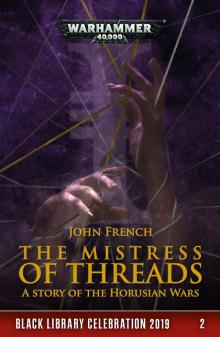 The Mistress of Threads - John French
The Mistress of Threads - John French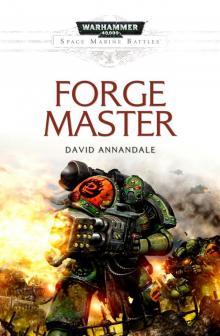 Forge Master - David Annandale
Forge Master - David Annandale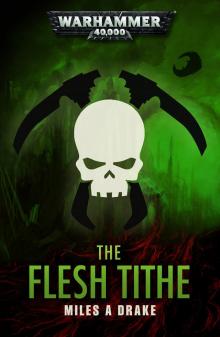 The Flesh Tithe - Miles A Drake
The Flesh Tithe - Miles A Drake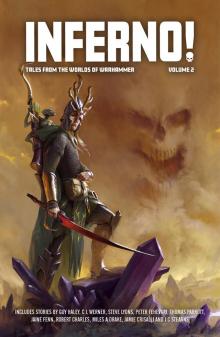 Inferno Volume 2 - Guy Haley
Inferno Volume 2 - Guy Haley Mercy of the Dragon - Nick Kyme
Mercy of the Dragon - Nick Kyme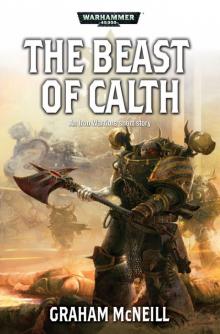 The Beast of Calth - Graham McNeill
The Beast of Calth - Graham McNeill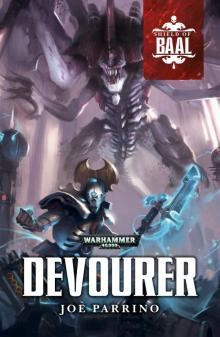 Devourer - Joe Parrino
Devourer - Joe Parrino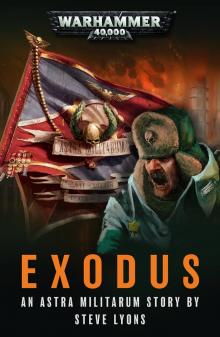 Exodus - Steve Lyons
Exodus - Steve Lyons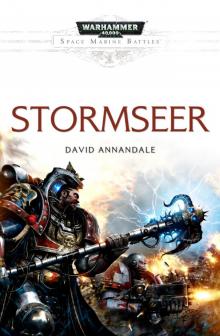 Stormseer - David Annandale
Stormseer - David Annandale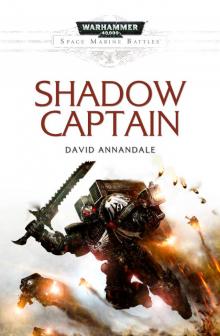 Shadow Captain - David Annandale
Shadow Captain - David Annandale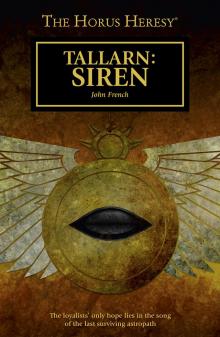 Tallarn- Siren - John French
Tallarn- Siren - John French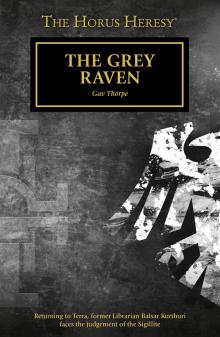 The Grey Raven - Gav Thorpe
The Grey Raven - Gav Thorpe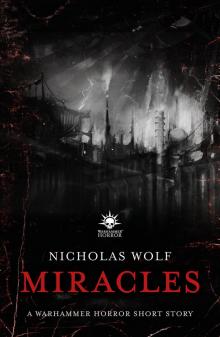 Miracles - Nicholas Wolf
Miracles - Nicholas Wolf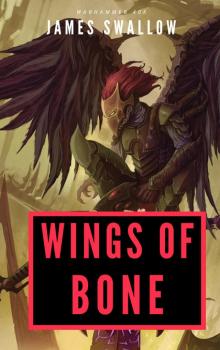 Wings of Bone - James Swallow
Wings of Bone - James Swallow